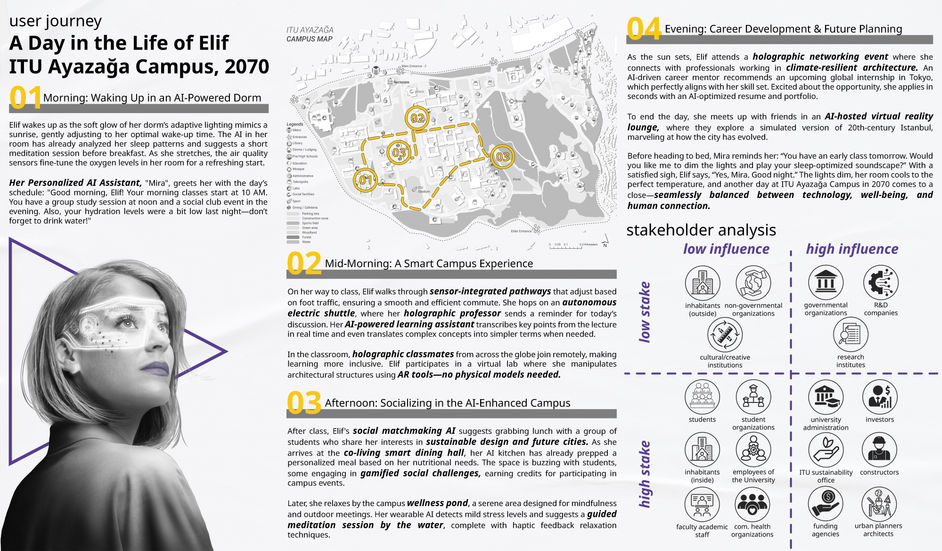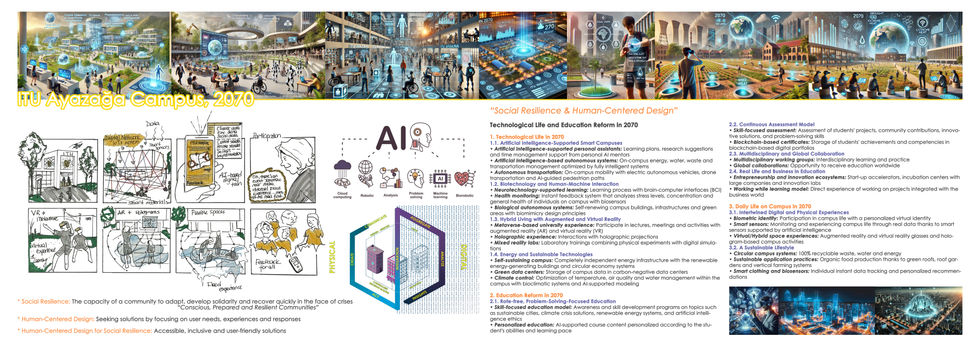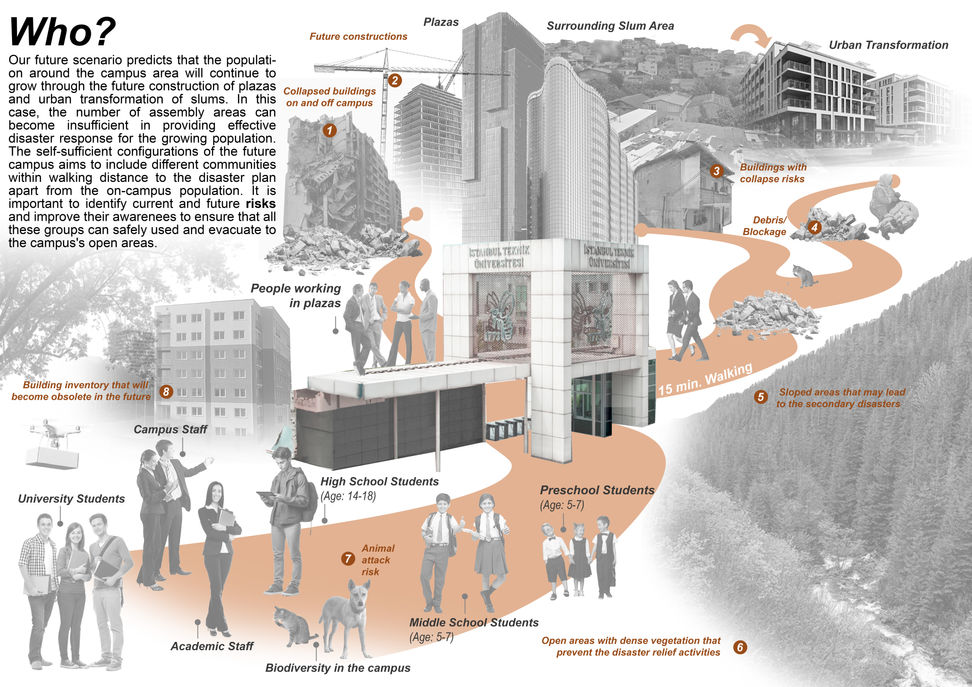Future Campus with Climate Challenges: University Campus Life_ITU 2070
This in-person workshop is part of the “Innovative Digital Approaches for Sustainable Urban Futures- in[n]urban” EELISA project, 4 different study groups have formed following these questions and themes below:
Group 1_
Resilient and adaptive energy-transportation system
Vanessa Hasbleidy Torrodero Numpaque | Universidad Politécnica de Madrid (UPM)
Elif Serdar Yakut | Istanbul Technical University (ITU)
Silvia Viviana González Rodíguez | Universidad Politécnica de Madrid (UPM)
Muhanad Azmi Mohamed Osman | Istanbul Technical University (ITU)
Sabina Mihaela Costinescu | Universitatea Politehnica din București (UPB)
Francisco Javier Fernandez Fidalgo | Universidad Politécnica de Madrid (UPM)
Group 2_
Group 2_
Healthy and inclusive spaces
Mehmet Ronael | Istanbul Technical University (ITU)
İrem İncetuzcu | Istanbul Technical University (ITU)
Mevce Nalçacı | Istanbul Technical University (ITU)
Group 3_
Social resilience and human-centered design
Mehmet Ronael | Istanbul Technical University (ITU)
İrem İncetuzcu | Istanbul Technical University (ITU)
Mevce Nalçacı | Istanbul Technical University (ITU)
Group 4_
Education and awareness-based approaches in post-disaster contexts
Büşra Nur Gündoğdu | Istanbul Technical University (ITU)
Raya Atour | Istanbul Technical University (ITU)
Tuba Buran | Özyeğin Üniversitesi
Barış Uzyıldırım | Istanbul Technical University (ITU)
Christian Andrei | Universitatea Politehnica din București (UPB)
Workshop Questions
Participants will engage in hands-on scenario-building, group discussions, and collaborative design sessions to address the following questions:
# How can AI, digital twin, and BIM be used for climate change resilience at ITU Ayazağa Campus?
# How do we use LLMs to identify problems and reach solutions?
#How can we { as a citizen, designer, engineer, etc.} use digital technologies to get insights for future visions?
# How will urban futures change with the developments of AI, digital twins, and BIM technologies?
# How will society adapt and function in generating urban futures by using these technologies?
Workshop Focus/ Themes
The participants will generate narratives linked to the ideals below while imagining also the ways of life and potential future lifestyles on campus through storytelling, scenario-building, and social adaptation to climate challenges. Our discussions and activities will focus on circular, community-driven, resilient and smart campus ideals defined as following:
-Circular Campus Systems focus on how campuses operate with maximum resource efficiency and minimal waste by exploring the closed-loop systems for waste, food, water and material use and consumption.
-Resilient Campus Ecosystems focus on nature-based solutions and disaster preparedness while adapting to climate change. Climate-responsive architecture and planning can be discussed linked to this domain along with biodiversity, green and blue infrastructure notions.
-Community-Driven Futures elaborate campus as an arena for collaboration between university staff, students and surrounding communities by reconsidering co-living, public engagement, shared-knowledge platforms and multi-functional hubs for communal skill set generations. -Smart and Interactive Campuses focus on how AI, data-driven methods and IoT enhance campus livability, functionality and sustainability. While energy and air quality can be drivers for this theme also well-being and human-centered designs can be included in the scope of interactive experiences. In achieving these ideals the students may work on one or more of the following possible themes, or suggest additional themes:
-Net-Zero Energy Campuses: This theme explores the campus system networks regarding energy efficiency, renewable energy, and carbon neutrality and their relationship with built-environment and nature.
-Healthy and Inclusive Spaces: This theme concentrates on physical and mental health of the inhabitants of the campus by prioritizing inclusivity and accessibility.
-Sustainable Mobility & Transportation: This theme focuses on minimizing environmental impacts, enhancing accessibility, and promoting healthier lifestyles. By prioritizing walking, biking, and efficient public transit systems, universities can significantly reduce greenhouse gas emissions and energy consumption. Integrating electric vehicle charging stations, carpool programs, and bike-sharing schemes are some examples of eco-friendly commuting on campus.
-Post-Disaster Campus Design: This theme focuses on the adaptive scenarios of the campus spaces and management systems for post-disaster situations for risks and hazards like earthquake, diseases ,chemical leaks, war, etc. Modular, flexible designs and incorporation strategies along with resource allocation topics are included in this theme.
-Social Resilience and Human-centered Design: Beyond infrastructure, the human dimension of campus life is crucial for social resilience and well-being. This theme explores how physical and social spaces can foster inclusivity, mental health support, and cross-disciplinary collaboration. Additionally it investigates policies to ensure equitable access to resources and services.
-Education & Awareness-based Approaches: In this theme, participants address how to incorporate sustainability and climate awareness into research agendas, and everyday campus life. This includes service-learning models, faculty-student collaboration on real-world projects, and campus-wide outreach efforts that promote climate literacy and behavioral change. How these notions will evolve in 2070 will be the main question of this theme.



























